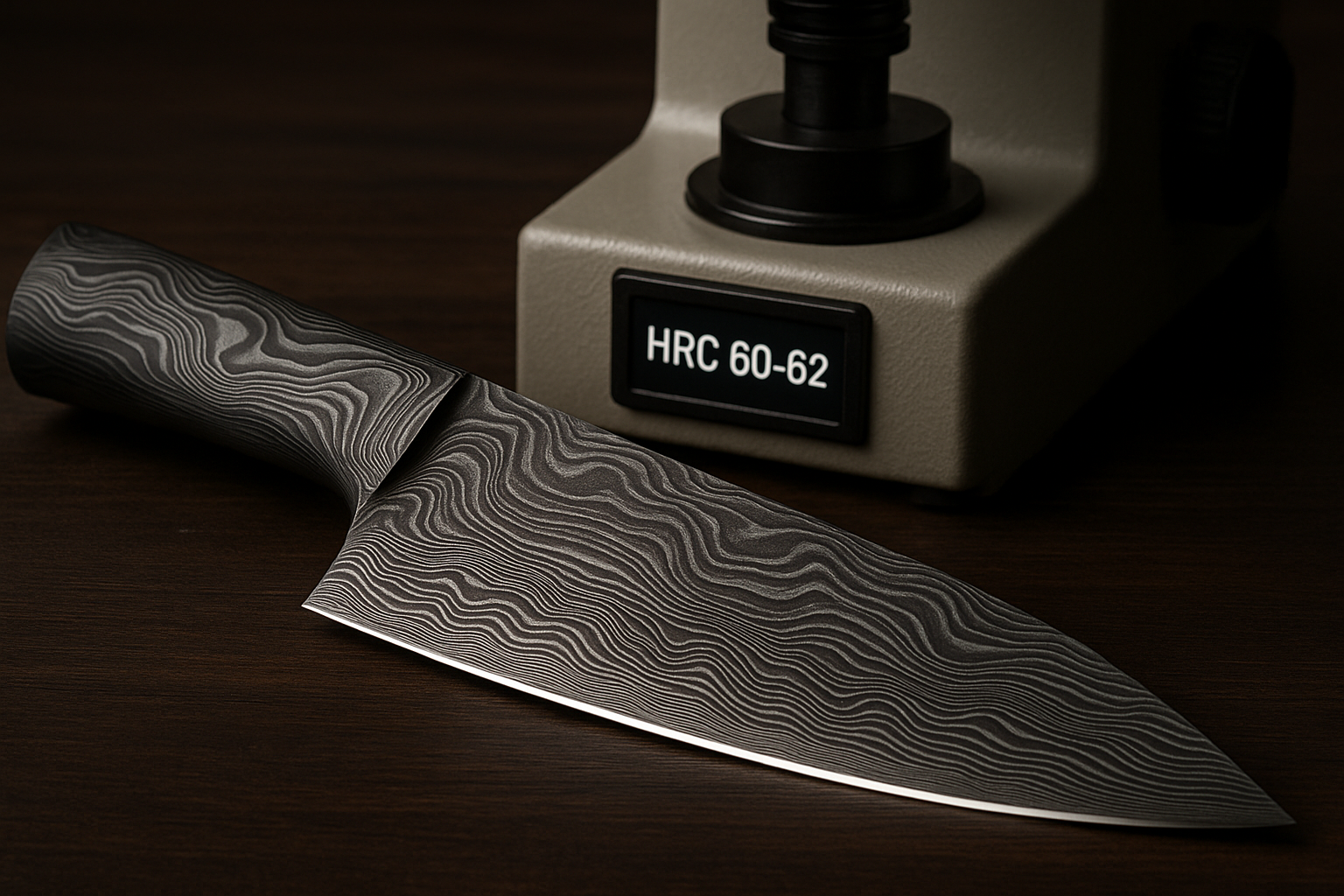Your Cart is Empty
FREE SHIPPING FOR USA

Damascus knives are celebrated worldwide for their legendary beauty, cutting power, and durability. One of the most important factors that defines their performance is hardness, often measured using the Rockwell Hardness Scale (HRC).
If you’ve ever wondered “How hard is Damascus steel?” or “What Rockwell hardness is best for a Damascus knife?” — this guide covers everything you need to know.
We’ll explain what HRC means, how it applies to Damascus steel knives, and why understanding hardness helps you choose a high-quality blade that balances sharpness and toughness.
The Rockwell Hardness Number (HRC) is a scale that measures how resistant steel is to indentation, scratching, or deformation.
In simple terms:
Higher HRC = harder steel, better edge retention.
Lower HRC = softer steel, more toughness and flexibility.
The Rockwell scale was invented in 1914 by Hugh and Stanley Rockwell and remains the standard for testing knife steel hardness today.
Modern Damascus steel knives typically fall between 55 and 62 HRC — an ideal range for cutting performance.
At this range, Damascus blades offer a balance of hardness and toughness, meaning they stay sharp for longer while resisting chips and cracks.
This balance is why Damascus knives are loved by chefs, collectors, and outdoor enthusiasts alike.
The hardness of a Damascus knife doesn’t come from looks alone. Several key factors influence the final HRC rating:
Damascus steel is created by layering different types of high-carbon steels. The steel mixture determines hardness:
High-carbon steel = harder, sharper, more wear-resistant.
Lower-carbon steel = tougher, more flexible.
Heat treatment is critical.
The steel is heated and quenched (rapidly cooled) to increase hardness.
Proper tempering prevents brittleness.
Poor or uneven heat treatment = weak, underperforming blade.
Traditional blacksmiths and modern forges use different methods. A skilled smith ensures:
Balanced hardness & toughness.
Strong, durable edges.
Beautiful Damascus patterns that also perform in real use.
Understanding HRC helps you predict how a Damascus knife will perform:
Higher HRC (58–62) = stays sharp longer.
Perfect for chefs and professionals who need long-lasting sharpness.
Harder knives resist wear and deformation.
Essential for outdoor knives, hunting blades, and everyday use.
Harder steel = cleaner cuts, precision slicing, and consistent performance.
Ideal for both food prep and detailed cutting tasks.
Note: Too much hardness can make a blade brittle and prone to chipping. The best Damascus knives balance hardness and toughness.
Here’s a quick guide to selecting a Damascus blade based on hardness:
55–57 HRC: More flexible & tough → best for survival knives, machetes, outdoor tools.
58–60 HRC: Balanced sharpness & durability → ideal for kitchen knives & all-purpose blades.
61–62 HRC: Superior sharpness & edge retention → perfect for collectors, precision cutting, or light-duty use.
Always check the HRC rating in product descriptions when buying online. Reputable knife makers test their blades and publish Rockwell hardness results.
Damascus steel traces its origins to ancient Indian Wootz steel, later perfected by Middle Eastern smiths.
Today’s modern Damascus steel is made by forge-welding multiple steel layers to create striking wave-like patterns while enhancing performance.
Unique, one-of-a-kind visual patterns.
Long-lasting sharpness & edge retention.
Excellent strength and durability.
A blend of artistry and functionality.
This combination makes Damascus knives popular with chefs, outdoor professionals, and collectors.
When investing in a Damascus knife, knowing its Rockwell hardness rating (HRC) is key. It tells you:
How sharp the blade will be.
How long it will stay sharp.
How durable and tough it will remain over time.
The ideal hardness for Damascus steel knives is 55–62 HRC — delivering long-lasting sharpness, reliable performance, and stunning beauty.
Whether you need a Damascus kitchen knife, hunting blade, or collector’s piece, choosing the right hardness ensures your Damascus knife is built for your purpose.
Explore our collection of expertly forged Damascus Blades with tested Rockwell hardness ratings — designed for serious users and collectors who value both performance and artistry.
Here’s the optimized FAQ section you can add to the end of your article:
Yes. Most modern Damascus steel knives fall between 55–62 HRC on the Rockwell scale, which is considered a strong balance of hardness and toughness. This range allows Damascus blades to stay sharp while resisting breakage.
The best hardness depends on the use case:
55–57 HRC: Tough and flexible, ideal for outdoor and survival knives.
58–60 HRC: Balanced hardness, perfect for kitchen knives and all-purpose use.
61–62 HRC: Maximum sharpness and edge retention, best for precision cutting or collector’s knives.
Not always. Some high-end stainless steels can reach 60+ HRC, but Damascus knives offer a unique balance — they combine hardness with durability and flexibility. Unlike standard stainless, Damascus also provides superior edge retention and aesthetic beauty.
No. While higher HRC (harder steel) holds an edge longer, it also makes a knife more brittle and prone to chipping. The ideal knife balances hardness and toughness, which is why most Damascus knives stay in the 55–62 HRC range.
Reputable knife makers list the Rockwell hardness rating (HRC) in product descriptions. Some manufacturers test hardness with professional Rockwell machines. If hardness is not mentioned, it may indicate the blade hasn’t been properly tested.
Hardness determines:
Sharpness & edge retention (harder knives stay sharp longer).
Durability (resistance to wear and bending).
Cutting performance (cleaner, more precise cuts).
A knife that’s too soft won’t hold an edge, and one that’s too hard may chip. Damascus steel achieves an ideal middle ground.
Yes. If a Damascus blade exceeds 62 HRC, it risks becoming brittle and easier to chip. That’s why most skilled makers aim for the sweet spot of 58–60 HRC for daily-use knives.